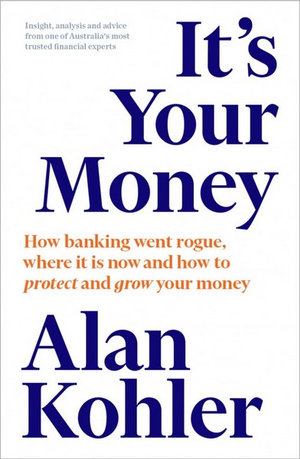Book Review – It’s Your Money by Alan Kohler

Alan Kohler has spent 45 years of his life researching, writing, and talking about the Australian financial world. He is a wealth of knowledge, and he has firsthand experience that is almost peerless. He also hosts a weekly podcast The Money Café which I regularly listen to, and I do recommend as it is informative and interesting and is a good way to learn a small piece about what is happening in the world from a financial perspective.
It’s Your Money is written in three main sections:
- What went wrong with the banking system, including all the steps and legislation over the years that lead up to the issues.
- Go through the results from the Banking Royal Commission, and talk about where the findings may have missed the mark
- How to help the reader take back control of their finances
My main interest in this book was the first and second section. I clearly remember the Banking Royal Commission of 2017-18, and I heard a lot of the horrible stories that came out of it of truly despicable acts that the banks had carried out over the years. What I did not know was how they were able to get away with it for so long, what steps were taken to reach the stage we eventually got to. It was really eye opening for me to see how it all started back in the late 1980s and early 1990s, at least that is when it appeared the wheels were set in motion.
The majority of the book then goes on to talk about how to find a good financial advisor, and what you should be looking for exactly. It also provides some useful questions that you can ask when you are shopping around to find a financial advisor. The information and advice provided is really beneficial, particularly for people who want to invest their money wisely but may not have the time/motivation to educate themselves enough to do it themselves.
Since I have not looked into financial advice personally, it was interesting to see what sort of fees some of these people actually charge, and I think for people who will be looking at obtaining financial advice, it is really helpful to see what the full cost of the advice will be (rather than just seeing a % fee for service) and how much it will impact them financially in the long term.
There is also a large section which goes into all the different types of investments available, on top of just the basic ones like shares and property (although these do have their own chapters). There is a chapter also on managed funds, index funds as well as alternative asset classes. Under alternative asset classes there was an introduction to hedge funds, infrastructure funds, private equity, derivatives, options, CFDs as well as strategies that are used for each of these classes. I found this interesting, because while I do not really look into these alternative asset classes, it was useful to at least learn a bit more about them.
One glaring omission in my opinion was there was no discussion on Cryptocurrency at all, but from listening to the podcast it appears Alan Kohler has no faith at all in Cryptocurrency, and hence has not spent much time looking into it in enough detail to be able to write about it. Although there was a small section on “Famous Bubbles” and it had Bitcoin (2014-?) so that might give a bit more insight to his opinion on Cryptocurrency.
There was also a useful section on how you should be investing at different stages of your life, whether early on and just starting out, middle of your career and approaching retirement. I found this interesting as it is something that needs thought put towards it, but not always necessarily carried out beyond the bare minimum. Investing successfully will mean changing strategies as your life progresses and it is good to have framework to adapt to the changes.
Overall, I really enjoyed this book. I respect Alan Kohler and value his opinion, so whenever he says something to say I will be willing to listen. This book was no exception, I found the start of the book interesting and eye opening as to what happened around all the Banking issues, and I learnt a lot of financial advisors which I did not know prior to reading. There is a concern it may become dated in a few years (it was written in 2019) as things change, already it talked about the real estate market being flat! But there is still enough core knowledge which will be relevant for a long time.